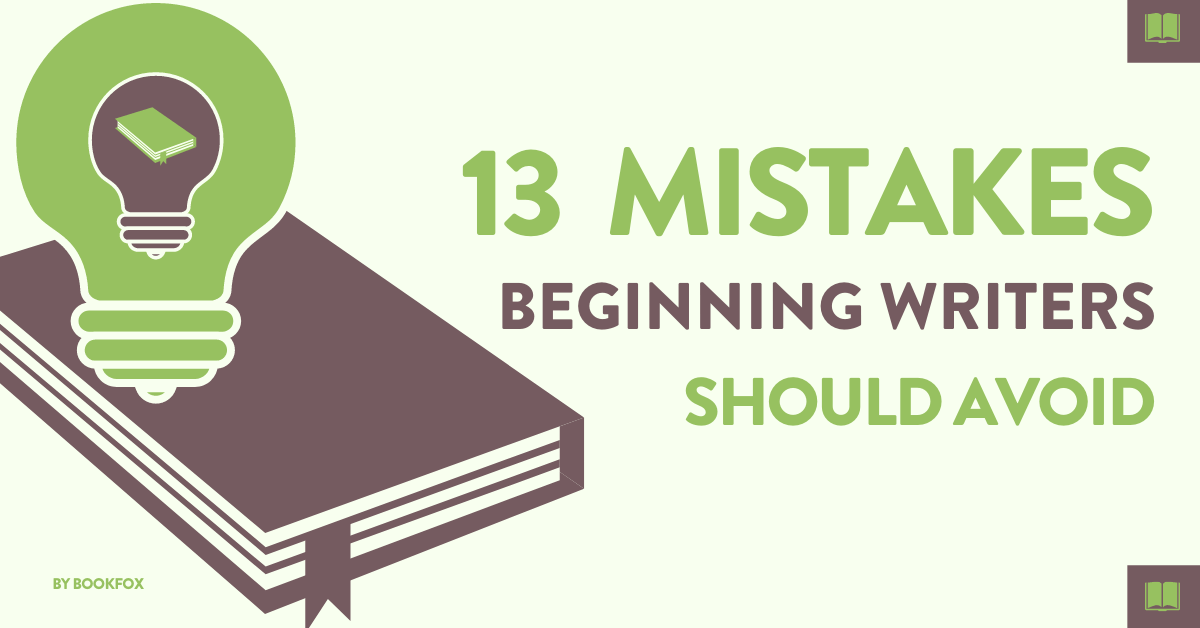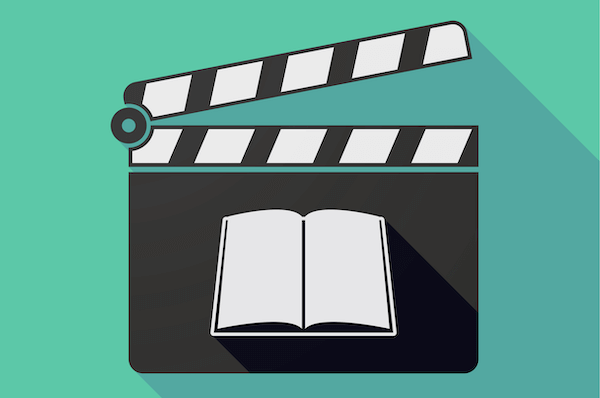
1. Present Tense
This is the default tense of nearly all beginning writers.
The trouble is that few established authors use it. It’s more of an exception than the rule.
So when you write your book in present tense, it’s like you’re marking it with a giant stamp that screams to every agent, publishers, and reader: “I’m a Beginner! I’m just learning how to write!”
Now you might say that your favorite book is in present tense, or namedrop famous novels in present tense. No disagreement there!
I don’t hate reading present tense. I’m not ignorant of the many fine books in present tense. But a disproportionate number of beginning writers choose it, and published authors rarely do.
Basically, this is just friendly advice to help you avoid looking like a total newbie.
2. Writing Cinematically

Wait, you say: isn’t it good to write like a movie? I mean, get all the action, and the facial expressions, and the quick pace, and write in scenes, and show, don’t tell?
Well, to some extent, yes. But if the only writing techniques you know are from movies, you’re going to try to stuff a movie into the form of a book, and usually that doesn’t work well.
Why not learn how to write a booky book? A book that does what books do well? For instance, instead of trying to describe facial expressions (very cinematic) you describe inner sensations (“My insides felt as if they had melted” or “my veins contracted, my skin froze.”)
A movie can’t communicate those type of deeply personal and inner sensations. While a book isn’t as good at describing expressions.
3. Relying on other Genres
I have had hundreds of debates on Twitter with writers between the ages of 15 – 30 who say they don’t read books.
They say they get all their narrative ideas from manga, movies, television, and plays.
This is the stupidest thing you can ever do as a writer.
Imagine a musician who never listened to music. Imagine a painter who never looked at any other paintings.
We would call them insane.
But there is an entire generation of writers who are functionally illiterate. Just yesterday someone bragged to me on Twitter that they haven’t read a book in fifteen years. And they’re a writer. Note well: this is not something to brag about.
I’m telling you right now: if you watch more television and movies and plays than you read, then you should be writing screenplays and plays.
If you want to write books, YOU HAVE TO READ BOOKS. This isn’t remotely debatable, so please don’t start a fight in the comments section. It’s patently obvious.
Can you learn from other genres? Of course! Of course! I learn all sorts of techniques from movies and plays and television. Pacing, dialogue, narrative twists, structure, time, etc. But I could list many, many more things that I’ve learned from books, and many more techniques that I could ONLY learn from books.
4. Disconnected Sentences
When beginning writers learn that agents, editors, and publishers reject manuscripts after reading a single page, they are skeptical. They think that they are getting short thrift. If only they read to the third chapter, they say.
But a coach can watch a runner and know within a few strides whether they can run.
As a former reader for lit mags, and a longtime editor, I can tell you that I can get a good sense of a writer’s talent after a single paragraph.
How? The sentences.
Beginning writers don’t connect their sentences like a caboose. They’re disjointed. They feel like they were written, thrown in a Lotto tumbler, and picked out at random. There is no rhythm to them. There is no pattern or music.
So beginning writers MUST learn to make their sentences flow. It’s what casts a spell over readers, and it’s what convinces agents/publishers/editors that you can actually write.
Yes, characters, plot, dialogue — all this is important. But sentences are the foundation. Without them, most readers won’t get to all the other good stuff.
5. “Self Editing”
Self Editing is an impossible term. Now let’s define the term: if you mean, I should revise my own work before sending it out, then wonderful! That’s not called self editing, that’s called revision.
But most authors define self editing as: it’s possible for the author to do the editorial work necessary before publishing their book.
This is rubbish. The best editors in the world still hire editors to catch all their mistakes.
I have a half page test that I give to people who think they can edit. Most beginning authors catch 3 – 5 mistakes on the page. Established authors can find 8 – 12.
There are 23 mistakes on the page.
If you’ve ever had a professional copy edit (and I’m not talking about a freelancer you found on the internet, but a copy editor currently working for one of the big 5 publishers), then you know that you’re making 10 – 15 mistakes ON EVERY PAGE OF YOUR MANUSCRIPT.
I’m not talking about misspellings. I’m talking about invisible mistakes that if you read your page a thousand times, you would never find because you simply don’t know the rules.
Try not to use the term “self editing” ever again. And hire a bloody editor who knows what they’re doing.
6. Fretting about Copyright

It’s the first thing that beginning writers bring up with me. Should I copyright my idea? Should I copyright my book?
That’s about the last thing the writer should ever think about.
If you self publish, and you want peace of mind, it’s fine to copyright your book. Sigh. I suppose.
I mean, you’ll never be able to sue the people who put it on the internet for free, because they are shadows and ciphers that live in third world countries, but maybe you’re worried about your neighbor stealing it.
The truth is that almost nobody steals books.
- There’s no money in it. What kind of stupid robber steals something when they’re going to lose money on it 95 times out of 100? Books are not lucrative.
- It’s very easy to sue someone in the same country as you who takes your exact words and puts their name on the cover. You can even apply for copyright retroactively. So once again, there is no financial incentive for anyone to do this. They are going to lose money. And if they’re outside the country, you have zero legal remedy, unless you want to hire a hit man.
- You can’t sue anyone who takes your title or idea. Those aren’t copyrightable.
Only beginning writers fret about copyright. Established writers know that they legally own words as soon as they reach the paper or screen (at least in the United States, since 1972), and only worry about making their story the best it can be.
7. Publishing Too Soon
Beginning writers often finish a book, and then send it out to agents/publishers or start the self publication process.
Nope. I got a whole bucketful of nope for you.
When you finish a draft of your book, you’re not done. You’re about one sixth of the way through the process.
- Finish the Draft
- Let it sit in a drawer for 2 months
- Revise
- Feedback from Beta Readers and Revise
- Feedback from Developmental Editors/Copy editors and Revise
- Marketing
I know writing that last chapter feels like you’ve finished, but honestly it’s just the first step in the journey (sorry!).
Most writers who publish the first books they wrote regret it. They feel embarrassed by that early work.
There’s no shame in sticking it in a drawer and seeing whether it still holds up once you lose your rose-colored glasses in a few months. There’s no shame in starting that second book.
Patience is the most important virtue that a writer can possess. You will never regret exercising it.
8. Thinking of Themselves
I interact with a lot of writers who seem to be flabbergasted that people other than themselves will have opinions about their book.
They are writing the book for themselves and not for anyone else.
For me, the purpose of writing is to communicate with another human being. I mean, my journaling is for self consumption only, but when I write fiction or nonfiction in a book, I want to communicate.
That means you have to think of the reader.
- Think about what a reader wants from a story (plot? Characters? Pacing?)
- Think about how readers of a particular gender, ethnicity or religion might read your book (for instance, in “The Friend” by Sigrid Nunez, she writes that men shouldn’t be writers. As a male writer, I found this idea rather sexist and bigoted).
- Consider whether asking the reader to read a 85 page speech will be too taxing on their patience (I’m thinking of the John Galt speech in Ayn Rand’s “Atlas Shrugged.” Don’t do it).
Now, writing a book is certainly personally fulfilling. And I only write books that I myself would want to read.
So I’m never writing a book ONLY for others. I’m writing a book that I enjoy AND thinking about the reader at the same time.
9. Early Success Syndrome

So many writers have a dream of hitting it out of the park on their first novel.
And when they don’t finish it, or they publish it and it fizzes, they’re disappointed. They quit writing or get bitter.
But this is simply unrealistic.
Squeegee that early success idea out of your writing brain. Seriously. Here’s what you should expect instead:
- You’re going to write a failed novel. One that’s not publishable. Virtually every single writer on each does this. It does not make you a special unicorn. Maybe you won’t finish your first novel or you will finish it and it will be rubbish.
- Your first book will sell only moderately well. Self publishing could be a few hundred copies to a few thousand copies. It’s exceptionally rare that a first book will sell over 10,000 copies, and if it happens, that’s because it was free or .99 cents.
- You should get up to full steam by book 3 or 4. You’ll get a name for yourself. You’ll carve out a space for yourself and readers will know you as a brand. By book 5 – 8 you should be making a full time living for yourself, depending on the genre and the commercial potential for your type of writing.
So drop the fantasies of Oprah and the Morning Show circuit and Reese’s Book Club, and come back down to earth. You’re going to write the best thing you can and some people are going to read it and enjoy it.
That’s what you can expect, and if by some wild crossing of the stars you hit it big, then you can be pleasantly surprised.
10. Ignoring Beta Readers
Beginning writers often don’t take advice well. By which I mean:
- They listen to everyone who tells them something about their book
- They listen to nobody
Established writers have a good sense of what advice to ignore and what advice to take.
So beginning writers should work on ferreting out what advice about their book is good, and what advice will lead them down the wrong path. In general, you should listen to the feedback of your Beta readers.
They know when something is wrong, even if they’re completely mistaken about how to fix it. So even if you don’t take their advice on HOW to fix it, 90% of the time you should realize that what they’re pointing to is a mistake of some type.
Sure, listen to sensitivity readers, listen to your beta readers, listen to your developmental editors, but just don’t ruin your conception of the book when revising. Ultimately, it’s still your book.
Gauge yourself: are you the type of person that takes advice too easily, or never takes advice at all? Whichever way you lean, you’re going to have to tilt the other direction to be a better writer.
If you’re liking this post, I’d recommend reading 10 Career Mistakes Writers Should Avoid.
There’s not much overlap between the two posts — the other one is a bit more philosophical, about the writing mindset — but I think you’ll probably enjoy it.
11. Book Concepts with No Legs
Most beginning writers have a difficult time choosing the right book concept.
Maybe they haven’t read enough, but this is a skill that can only be gained with time.
Agents tend to be the best at judging book concepts, because it’s all they do — it’s basically their job definition. So if at all possible, go to a book conference or fair where agents will be and pitch them your book early in the process. Gauge their reaction. Are they excited or merely polite?
Find someone who can guide you to a better book concept, such as:
- a more exciting one
- one with more tension
- a more marketable one
These little tweaks can save you years of your writing life.
Sometimes I get pitches about a book and I think: you’ve made it sound very boring. I don’t know why a reader would choose to read it, or a publisher/agent would choose to get involved.
The other huge mistake I see is book concepts that sound like knockoffs. It’s too close to Divergent or Harry Potter or Girl with the Dragon Tattoo, or it sounds like a thousand literary novels that are domestic and neat and tame.
Write the book that only you can write. Stamp it with your vision and personality.
12. Showing, Not Telling
You probably misread the headline above. You thought I said “Telling, not Showing” would be the mistake.
That’s what everyone says. They encourage you to show, show, show. Don’t tell the reader anything! Create scenes!
But I’m telling you to Tell.
Beginning writers are often very bad at telling, and yes, telling is essential for good writing.
Look, beginning writers tend to have fewer tools in their toolbox. So at those early stages, it’s not a bad idea to focus on showing.
But as you get some writing experience under your belt, it is ESSENTIAL that you start telling.
By “telling” I mean:
- summarizing dialogue
- summarizing swathes of time
- telling the reader directly about a character rather than demonstrating it in a scene.
All of those things above quickens the pace and gives the reader a quick morsel of information.
More experienced writers switch seamlessly between showing and telling. And in fact, some great writers, like Elena Ferrante, Wendell Berry, and Roberto Bolano write mostly in summarization and telling.
13. Following Rules
You probably have learned a ton of rules, like “show, don’t tell” above.
But every writer needs to learn to break the writing rules. Maybe even some of the ones I’ve listed on this page.
It’s best when beginning writers can understand the purpose behind a rule, because that way they have a chance to know why they would want to break it.
You will forever stay a beginning writer if you don’t start to break some writing rules at some point. Once you feel like you’ve mastered the basics, then it’s time to start bending the rules and trying to flex your narrative beyond them.
Sometimes it won’t work, but you’ll gain a ton of valuable experience if you understand why.

8 comments
I thought this was an excellent advice! (From a beginning writer.)
I needed to read all of this! Thank you for posting! Very much a fresh take on much needed advice.
Great advice. I rewrote my first novel in past tense and got better feedback right away. I also like the reversed show don’t tell advice. It confirmed something I’ve felt for a while. Why NOT tell how a character feels? Only books can do that. As with everything, it needs to be done with a feeling for rhythm and drama but in general, it’s good to remember what books can do better than movies once in a while.
Thank you, for an excellent post as always. I’ve probably read 200 books at the beginning of my children’s picture books. My husband has taken an interest in children writing and has written some books he wants to shop around. I’m jealous that he can produce some good books, or so I think. But I’ve been paralyzed to even start. Hopefully, I’ll sit down and begin a book. It’s so discouraging considering I’ve been studying for two years. Sorry didn’t mean to ramble on. Thanks again for your posts. They are amazing!
As always a perfect bit of info for newbie writers. While I’m not one, I’m currently coaching several and this list was so timely. I just spoke for 2 hours straight to a new writer, trying to condense my years of researching all things writing to impart to him. It amazes me that while a new writer may understand that it’s not an easy process they really have no clue. The first step, share your work with another set of eyes. Thanks John.
Thank you. Good advice for my current writing stage. Since January, I been completing each step in the class, “Your Best Children’s Book”. Currently, I’m doing some Beta testing with children and adults. When a 7 year old and a 70 year old make the same comment, it’s time to pay attention. I am thoroughly enjoying the process.
I loved this! As a newbie to this wonderful world of children’s books. I love your posts! I’ve read about one hundred children’s books and books and videos. But, I have this large fear of actually sitting down and beginning my book. I’m overwhelmed with info, but most of what you say sticks the most!
This was so helpful. Your advice was very eye-opening and made me reconsider several of the choices I had made. Thank you!